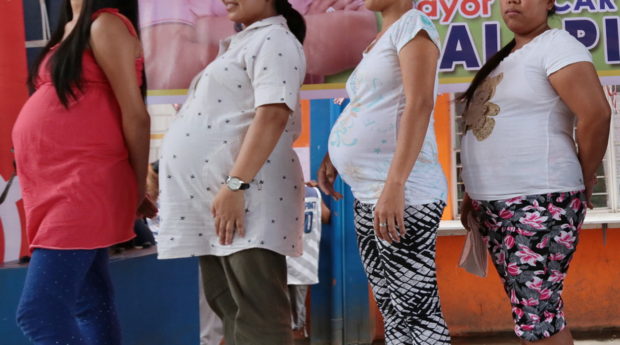Pregnant women urged to get vaxxed

BUMPED UP THE LIST Expectant moms should now get vaccinated to protect themselves and the children they carry from the risk of severe illness from COVID-19. The government has included them in the A3 priority group of the vaccination program. —INQUIRER FILE PHOTO
The Department of Health (DOH) on Thursday said pregnant women were now included in the A3 priority for COVID-19 vaccination and could get the potentially lifesaving shots in their second or third trimester of pregnancy.
In a statement, Health Undersecretary Maria Rosario Vergeire said experts have found COVID-19 vaccines to be generally safe for pregnant women as well as for breastfeeding mothers.
The Philippines is currently inoculating those under A1 (health-care workers), A2 (senior citizens), A3 (people with comorbidities), A4 (economic front-liners) and A5 (indigent population) under its vaccination priority framework.
Women in their first trimester whose pregnancies are considered high risk could also be vaccinated, Vergeire said, provided that “benefits and risks have been fully explained and upon securing medical clearance from their doctor.”
The health official, however, noted that the Russian-made Sputnik V was not suitable for pregnant women.
Article continues after this advertisementVergeire did not explain why the Russian-made vaccine was not recommended for pregnant women, only saying that the DOH would revise its existing guidelines for pregnant women based on the experts’ recommendations.
Article continues after this advertisementThe health department made the announcement following the US government’s appeal for pregnant women to get the vaccine.
Low miscarriage risk
In urging them to get inoculated against COVID-19, US health authorities argued that the data demonstrated that vaccination did not increase the risk of miscarriage.
The US Centers for Disease Control and Prevention (CDC) said miscarriage rates among women who received a vaccine were around 13 percent, about the same as the typical miscarriage rate of 11-16 percent of pregnancies.
CDC cited an analysis of current data showing there was not an increased risk of miscarriage among nearly 2,500 pregnant women who received an mRNA vaccine—the type of shots made by Pfizer and Moderna in the United States—before 20 weeks of pregnancy.
Rochelle Walensky, CDC director, said the agency “encourages all pregnant people or people who are thinking about becoming pregnant and those breastfeeding to get vaccinated to protect themselves from COVID-19.”
“The vaccines are safe and effective and it has never been more urgent to increase vaccinations as we face the highly transmissible Delta variant and see severe outcomes from COVID-19 among unvaccinated pregnant people,” Walensky said.
According to a recent study, only one in four pregnant women in the United States has received at least a first dose of a COVID-19 vaccine.
Although the overall risk of severe illness was low, CDC said pregnant and recently pregnant women were at an increased risk for severe illness from COVID-19 when compared with nonpregnant people. Severe illness includes those that require hospitalization, intensive care, need for a ventilator or special equipment to breathe, or result in death.
It said that evidence about the safety and effectiveness of COVID-19 vaccination during pregnancy has been growing and the data suggested that the benefits of receiving a vaccine outweighed the
risk, adding that there was currently no evidence that any vaccines, including those for COVID-19, caused fertility problems in women or men.
No safety concerns
“The benefits of receiving a COVID-19 vaccine for pregnant people outweigh any known or potential risks,” CDC said.
“The increased risk of severe illness and pregnancy complications related to COVID-19 infection among pregnant people make vaccination for this population more urgent than ever,” it added.
CDC has released the first US data on the safety of receiving an mRNA COVID-19 vaccine during pregnancy.
The report analyzed information from three safety monitoring systems in place to gather information about COVID-19 vaccination during pregnancy and the early results did not find any safety concerns for pregnant people who were vaccinated or their babies.
Another report looked at pregnant people enrolled in the v-safe pregnancy registry who were vaccinated before 20 weeks of pregnancy and CDC said scientists did not find an increased risk for miscarriage among people who received an mRNA COVID-19 vaccine during pregnancy.
V-safe is CDC’s smartphone-based tool that uses text messaging and web surveys to provide personalized health check-ins after vaccination.
“Many pregnancies reported in these safety monitoring systems are ongoing. CDC will continue to follow people vaccinated during all trimesters of pregnancy to better understand effects on pregnancy and babies,” it said.
The agency noted that additional clinical trials that study the safety of COVID-19 vaccines and how well they work in pregnant people were also underway or planned.
Vaccine manufacturers, it said, were also collecting and reviewing data from people in the completed clinical trials who received a vaccine and became pregnant. —With a report from AFP
For more news about the novel coronavirus click here.
What you need to know about Coronavirus.
For more information on COVID-19, call the DOH Hotline: (02) 86517800 local 1149/1150.
The Inquirer Foundation supports our healthcare frontliners and is still accepting cash donations to be deposited at Banco de Oro (BDO) current account #007960018860 or donate through PayMaya using this link.